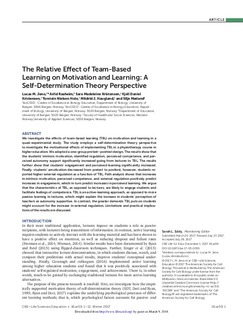The relative effect of team-based learning on motivation and learning: a self-determination theory perspective
Jeno, Lucas Matias; Raaheim, Arild; Kristensen, Sara M.; Kristensen, Kjell Daniel Berg; Hole, Torstein Nielsen; Haugland, Mildrid Jorunn; Mæland, Silje
Journal article, Peer reviewed
Published version

Åpne
Permanent lenke
http://hdl.handle.net/11250/2589963Utgivelsesdato
2017Metadata
Vis full innførselSamlinger
- Import fra CRIStin [3621]
- Institutt for helse og funksjon [588]
Originalversjon
Jeno, L. M., Raaheim, A., Kristensen, S. M., Kristensen, K. D., Hole, T. N., Haugland, M. J., . . . Eddy, S. L. (2017). The Relative Effect of Team-Based Learning on Motivation and Learning: A Self-Determination Theory Perspective. CBE—Life Sciences Education, 16(4) 10.1187/cbe.17-03-0055Sammendrag
We investigate the effects of team-based learning (TBL) on motivation and learning in a quasi-experimental study. The study employs a self-determination theory perspective to investigate the motivational effects of implementing TBL in a physiotherapy course in higher education. We adopted a one-group pretest–posttest design. The results show that the students’ intrinsic motivation, identified regulation, perceived competence, and perceived autonomy support significantly increased going from lectures to TBL. The results further show that students’ engagement and perceived learning significantly increased. Finally, students’ amotivation decreased from pretest to posttest; however, students reported higher external regulation as a function of TBL. Path analysis shows that increases in intrinsic motivation, perceived competence, and external regulation positively predict increases in engagement, which in turn predict increases in perceived learning. We argue that the characteristics of TBL, as opposed to lectures, are likely to engage students and facilitate feelings of competence. TBL is an active-learning approach, as opposed to more passive learning in lectures, which might explain the increase in students’ perception of teachers as autonomy supportive. In contrast, the greater demands TBL puts on students might account for the increase in external regulation. Limitations and practical implications of the results are discussed.
